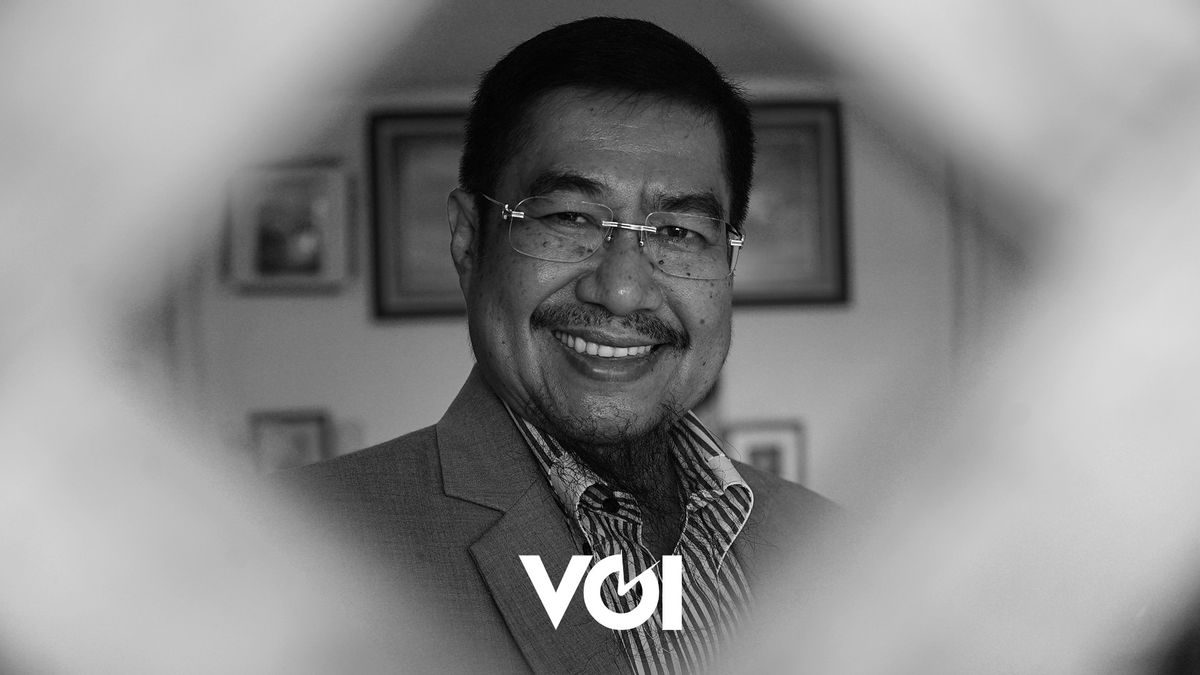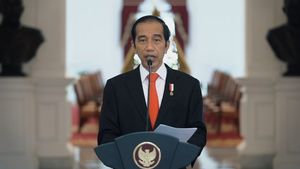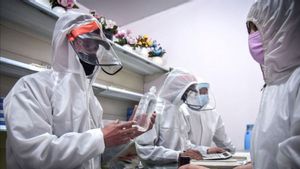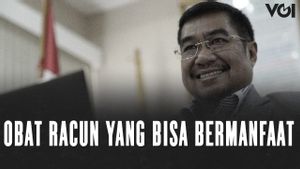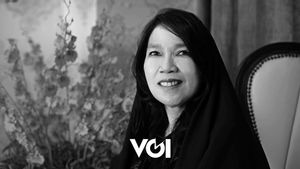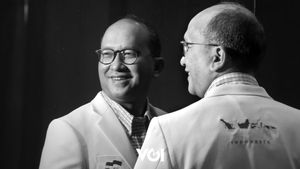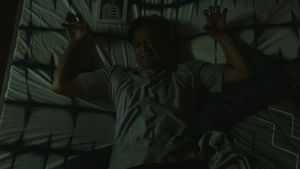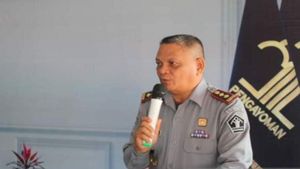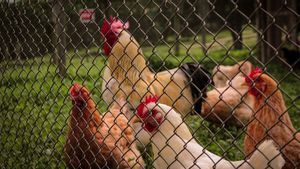Indonesia has rich medicinal plant potential and traditional medicinal ingredients have been consumed by people for generations. Therefore, the General Chair of the IAI (Indonesian Pharmacists Association) Apt. Drs. Nurul Falah Eddy Pariang fully supports the promotion of Indonesian traditional medicine. In the future, Indonesian traditional medicine is expected to become an alternative and competitive.
***
According to Nurul Falah Eddy Pariang, Indonesia's natural wealth has not been fully utilized. "Indonesia is a country with the second number of mega biodiversity after Brazil but is unable to utilize it in the form of pharmaceutical or drug preparations. Is it traditional medicine or traditional medicine for our own society," he said.
Based on the BPOM (Food and Drug Supervisory Agency) press release on February 19, 2020, Indonesia's potential is indeed much greater than other countries. No less than 30,000 species of plants and marine resources that can be used as basic ingredients for medicine. There are 9,600 species of plants and animals that have medicinal properties that have not been used optimally as herbal medicines. With this potential in the future, it is not impossible that Indonesia will become the world's leading exporter of herbal products.
Traditional medicine, said Nurul, has three classes. The highest is the phytopharmaca status. “There are three classes of traditional medicine; first is herbal medicine, second is standardized herbal medicine (OHT) and third is phytopharmaceutical. To become a fitofarmaka must pass clinical trials. Traditional medicines that have phytopharmaceutical status are equivalent to other medicines whose treatment is clinical trials. Thank God, that phytopharmaceuticals in Indonesia have been recognized. There is a term OMAI, namely modern medicine native to Indonesia. If it has become a phytopharmaceutical, that's cool, because its use is equivalent to other drugs. So it can be an alternative and compete with drugs that are already circulating,” he said, adding that the growth and development of traditional medicines must be supported so that they can add added value and improve the economy.
Even though traditional medicines have phytopharmaceutical status and have been circulated in the community, the government is still monitoring this in this case by BPOM, before the drugs are circulated and after the drugs are circulated in the community. The goal is that the drugs produced and used by the public are completely safe.
In addition to traditional medicines, Nurul Falah Eddy Pariang also talked about IAI's struggle to oversee the National Pharmacy and Pharmaceutical Independence Bill, about pharmacists' roles during the COVID-19 pandemic, and public understanding that is still minimal about the function and role of a pharmacist. This is a complete excerpt of the interview with Edy Suherli and Rifai from VOI who met him at the IAI Central secretariat, in the Tomang area, West Jakarta recently.

Can you tell us about your struggles and the IAI team in overseeing the formulation of the National Pharmacy and Pharmaceutical Independence Bill in the Indonesian House of Representatives until now?
Thank God I got this question. This is also a form of responsibility for us, the management of the Indonesian Pharmacists Association Center, and to all Indonesian pharmacists. So we have actually proposed the draft law since 2014. It has been included in the Prolegnas (National Legislation Program) of the DPR RI. At that time it was called the Pharmaceutical Practices Bill. We want to get protection while practicing, similar to the Medical Practice Act that is owned by doctors.
However, this Pharmaceutical Bill was not discussed, because there are three bills from different institutions concerning pharmaceuticals. First, we propose, the second is the Draft Bill on Drugs, Pharmaceutical Preparations, and Medical Devices. And the third is the Bill on Traditional Medicine from the Ministry of Health for Drug and Food Supervision. The Director-General of Pharmacy at the Ministry of Health of the Republic of Indonesia requested that these three bills be combined into one. IAI and the Ministry of Health agreed, but the POM wanted to propose a bill of its own. At the direction of the Director-General, the bill was changed to the Bill on Pharmacy and National Pharmaceutical Independence.
What are the contents of this Pharmaceutical Bill?
This bill does not only cover the practice of pharmacy, but also pharmaceutical staff, we know that pharmacists in pharmacies and pharmaceutical technical personnel. This must be regulated in such a way that it becomes human capital in the pharmaceutical field with different responsibilities and duties and most importantly both become professionals. After that set the matter of the practice of pharmacy itself. The pharmacist's job is to ensure that pharmaceutical preparations or drugs are made, distributed, and served to patients.
The most left behind is in the pharmaceutical service. People sometimes only go to the pharmacy to buy medicine, even though what is more important is the information from the pharmacist. Are there interactions with other drugs, and the question of drug side effects is also important. This can all be asked to the pharmacist.
Then pharmaceutical efforts, pharmaceutical facilities, pharmaceutical products, and pharmaceutical research and development. Learning from the COVID-19 pandemic, we are not independent in producing drugs, we also propose the issue of national pharmaceutical independence.
Why is it important to suggest this?
The problem is that Indonesia is a country with the second number of mega biodiversity after Brazil, but is unable to utilize it in the form of pharmaceutical or drug preparations. Is it traditional medicine or medicine for our own society. Then the progress of information technology was extraordinary rapidly. Now the purchase of drugs can be online. So how do people buy drugs online but still be safe. Then the relationship with BPJS is also regulated, we want to get partial capitation in BPJS, not only medical personnel.
Now the last thing we want to include in the Pharmaceutical Bill, is that educating pharmaceutical staff is in accordance with the competency standards that we have made. Pharmacists who graduate later are in line with what we expected.
When do Pharmacists expect this bill will be finalized?
Because this issue is urgent, we want this bill to be included in the priority Prolegnas. And hopefully, it will be discussed and approved soon.
When the Pharmaceutical Bill has not yet been discussed, for pharmaceutical matters, what law or regulation does it refer to?
Our reference is Health Law Number 36 of 2009 article 108. There is a separate article on pharmaceutical practice. This is in line with our expectations, starting from the procurement, storage, distribution, service of drugs based on doctor's prescriptions, drug information services, and traditional medicines that must be prepared by pharmaceutical personnel. Then there is government regulation number 51 of 2009 concerning pharmaceutical work. Then the Health Manpower Act No. 36 of 2014 he regulates it. Under PP 51 many Regulations of the Minister of Health regulate pharmaceuticals. It's just all spread over a few rules. Even the Narcotics and Psychotropic Law also protects pharmacists. The hope is that all of this is gathered in one law.

What did IAI do during the pandemic yesterday?
We helped form the COVID-19 task force, which takes care of the safety of practicing pharmacists, wearing PPE, keeping a distance, and so on. IAI also collects immunomodulatory drugs, and donated masks for those in need. When the Ministry of Health asks for volunteers, we can also provide them from pharmacists.
The task force is also trying to collect immunomodulatory drugs that will be clinically tested. Incidentally, there is a BRIN program that will test traditional medicines that are immunomodulators or increase the body's immune system. We participate by collaborating with BRIN, BPOM, and the Ministry of Health. We invite the Herbal Medicine Company Association to offer their herbal medicine products to be clinically tested. It's a shame this program can't be continued.
Why can't it continue?
Because there are requirements that must be met, even though the drugs to be tested are already registered with BPOM as traditional medicines. So we just need to upgrade it to phytopharmaca so that it can be clinically tested for this drug or not.
What are the medicines? There are three kinds, the first is Soman, produced by Harvest Gorontalo Indonesia, which is in the form of drops in the mouth. Second Imugar Deltomed production. And the three herbal cough medicines are also from Deltomed. We have proposed these three drugs for clinical trials, but are hampered by licensing from BPOM. Too bad it failed.
There are many hoaxes circulating during the COVID-19 pandemic, how does IAI deal with this?
During the pandemic we conduct webinars to members so that they can gain more knowledge about COVID-19. After that, the pharmacists conducted socialization in their respective environments. Education can be done through webinars, which are followed by communication and the general public. We have an educational format that is generically called Dagusibu. That is get, use, store and dispose of drugs wisely. During the pandemic his Dagusibu about COVID-19 medications.
So far, people often ask for a copy of a prescription. When they experience similar symptoms, they just buy medicine, what do you think?
If the gap is too long between buying the first drug and the next, my advice is to go to the doctor first even though the symptoms are the same. Because there are diseases that have the same symptoms but can have different diseases. In the past, when the doctor diagnosed dizziness and then gave him regular headache medicine, now he is also dizzy but it is caused by hypertension, this is a different medicine. The doctor will determine for medical indications. New to the pharmacy with a doctor's prescription.
The use of a copy of a prescription can be used for drug referrals for those who have degenerative diseases. Such as hypertension, diabetes who have been constantly taking medication. I propose for three months. So during those three months, there were no symptoms, as in the case of a back-and-forth, it was enough to be served by a pharmacist. But later in the third month, you have to go to the doctor for control. Or a month before the third month there is a problem, you have to go to the doctor first. So the collaboration of doctors and pharmacists is needed. The patient was not adequately treated by doctors, and pharmacists too.
Some say we are our own doctors, what do you think about this?
So our term is a doctor for ourselves, it is more appropriate for preventive efforts. So we try not to contract the disease by adopting a healthy lifestyle. As you get older, you have to be selective, then you have to exercise and avoid smoking.
But if we are sick we will not have the ability to self-diagnose. That's why we need doctors and pharmacists. A good pharmacist has a patient medication record. I recommend that people have family doctors and family pharmacists.
VOIR éGALEMENT:
Okay, China has recommended three traditional medicines for COVID-19 medicine even though Indonesia is rich in biodiversity, can we do that too?
Regarding this drug, we cannot be 100 percent independent. Drugs circulating in Indonesia are also circulating in other places, especially those produced by multinational pharmaceutical companies. The most important thing is that the drug must be registered with BPOM. If there is no meaning that the drug is illegal, even though in America, for example, it is registered. Traditional Chinese medicine is also the same, if it has passed the BPOM, it can be consumed here.
What has the government done for the discovery of our traditional medicine?
The government has carried out downstream research, collaboration with universities, pharmaceutical companies, and practitioners like us pharmacists. This must continue to be encouraged in order to find new drugs, then drugs that come to Indonesia must be investigated whether they are suitable for distribution and will receive registration from BPOM.
For traditional medicine, how does IAI support it so that it can advance to class?
There are three classes of traditional medicine; first is herbal medicine, second is standardized herbal medicine (OHT) and third is phytopharmaceutical. To become a fitofarmaka must pass clinical trials. So that phytopharmaceuticals are equivalent to other drugs whose treatment is clinical trials. Thank God, phytopharmaceuticals in Indonesia have been recognized. There is a term OMAI, namely modern medicine native to Indonesia. If it has become a phytopharmaceutical, that's cool, because its use is equivalent to other drugs. So it can be an alternative and compete with other drugs.
How do you see the supervision for the production of traditional medicines both on a home scale (MSMEs) and those that are already manufactured? The government implements pre-market supervision before the medicine is distributed and the post-market after it is distributed is supervised by BPOM. Only their use is not supervised, so we recommend that family doctors and family pharmacists carry out supervision. Hopefully traditional medicines that have been produced well can compete and become an alternative. Several brands of traditional medicine have now also been exported to foreign countries. We must continue to support this so that we can add added value and improve the economy.
How is drug control for Muslim consumers, of course it must be guaranteed to be halal?
Indonesia is a Muslim majority, so the law on halal guarantees should exist. There is a Halal Product Assurance Organizing Agency (BPJPH) in charge of this issue. We IAI strongly encourage its implementation even though it was postponed. After all, we take the medicine for the halal one. As long as there are halal drugs that are not halal, of course they are not used, except for emergencies.
I encourage pharmaceutical companies to be registered to get halal certificates, so that the Muslim community does not hesitate to consume these drugs. If there is a drug manufacturer that uses raw materials from non-halal, he must inform the meaning that it must be open.
The Power of Prayer in Nurul Falah Eddy Pariang's Activities

Prayers for the Chairperson of IAI (Indonesian Pharmacists Association) Nurul Falah Eddy Pariang has a very important position. Although he also follows the steps of a healthy life like most people, for him praying to the Creator is a priority. After praying and surrendering everything to the owner of this nature and everything in it, he just carried out his usual ways of life.
“As a religious person, the first healthy tip I do is pray. I pray to the Almighty. O Allah, save me from disease and give me health. That's the first and foremost thing I did,” said the man who was born in Wonosobo, Central Java, March 23, 1961.
This habit of praying, he also recommends to his fellow pharmacists who still practice serving the community. “To the practicing pharmacist who is on duty, I suggest praying for the people who come. There are those who are sick or their families are sick so that they are prayed for to be healthy," he said.
So we don't just rely on efforts through the drugs given, but the participation of the Almighty is also involved. Through the prayers that are said, it is hoped that complete health can be achieved.
In addition to physical illness, Nurul is also concerned about non-physical diseases. He also prayed to the Almighty so that he was avoided from evil that would affect physical illness. "O Allah, save me from moral evil, because bad morals can also be a disease, namely mental illness," said Nurul, who prays every day, especially during prostration during the five daily prayers.
Food

No less important is what Nurul does to maintain health is to control the food intake that enters her body. Because not all food can enter the body.
"I'm picky about what I eat for my body. What is not important to my body avoid as much as possible. I used to like to drink sweet drinks, now I don't. I used to eat large portions of carbs, now it's reduced. Instead of vegetables, fruits and foods that contain protein, “said the man who has now also quit smoking to maintain his health.
Although there are no taboos in terms of food, he has limited certain foods, such as red meat and fried foods. “I reduce my consumption of red meat. Also foods that are processed by frying, so I minimize fried foods. I used to love eating fried food, now in this office I forbid eating fried food. If there are guests, the fried food is replaced with fruit,” continued the man who likes reading, writing, jogging, and golf.
The next thing he did was exercise. The exercise he does is light and easy. “Exercise does not need to be long, at least 30 minutes once a day. I usually walk around the housing complex where I live. If the weather doesn't allow me to ride a stationary bike at home," he continued, suggesting that exercising outside while exposed to the sun is much better, especially during and after the COVID-19 pandemic.
Family

In the midst of his busy schedule as a pharmacist, he was a member of the legislature in the Indonesian House of Representatives, and professional organizations and other activities, Nurul still prioritizes relationships and togetherness with his wife and children. “Togetherness is very important. For someone like me, when I have the opportunity, I will optimize it as much as possible to gather with my family. Usually, it's on weekends, although sometimes there are meetings and invitations," said Nurul, who has three children from his marriage to Emy Indriastuti, a girl and two boys.
If on the weekends it turns out that there is a meeting or invitation to attend, Nurul will seek compensation on another day where they can both gather.
Communication for him is also very important. “People say quality is important, but for me, you can't find quality without quantity. So the quantity is no less important than quality," he said.
The business of visiting children is very important to him, and because of that, he will make time to meet with his son who is still studying outside the city. “Communication with children must be maintained, especially when they have problems. If we are close to their children, they will look for us to solve the problem, not on the other side. Disharmony often occurs because children do not complain to their parents,” said the alumni of the Faculty of Pharmacy, Gajah Mada University (UGM), Yogyakarta (1987).
Parents, said Nurul, must be sensitive to this situation. If necessary, explore the problems faced by the children. “Parents should not only blame their children when there is a problem. Then we have to find out what the root of the problem is," said Nurul, who emphasized to his children to put prayer first in dealing with any problems.
In order for behavior, said Nurul Falah Eddy Pariang, which is read must be good. “It is best for you to read and understand the scriptures of your respective religions. That is the grip and guide of life. Thoughts must be good, words must also be good. If everything is in harmony, it will become a habit and eventually become a character. This character will determine our destiny," he concluded.
“The most left behind is in the pharmaceutical service. People sometimes just go to the pharmacy to buy medicine, even though what is more important is the information from the pharmacist. Are there interactions with other drugs, and the question of drug side effects is also important. All of this can be asked to the pharmacist.”
The English, Chinese, Japanese, Arabic, and French versions are automatically generated by the AI. So there may still be inaccuracies in translating, please always see Indonesian as our main language. (system supported by DigitalSiber.id)
